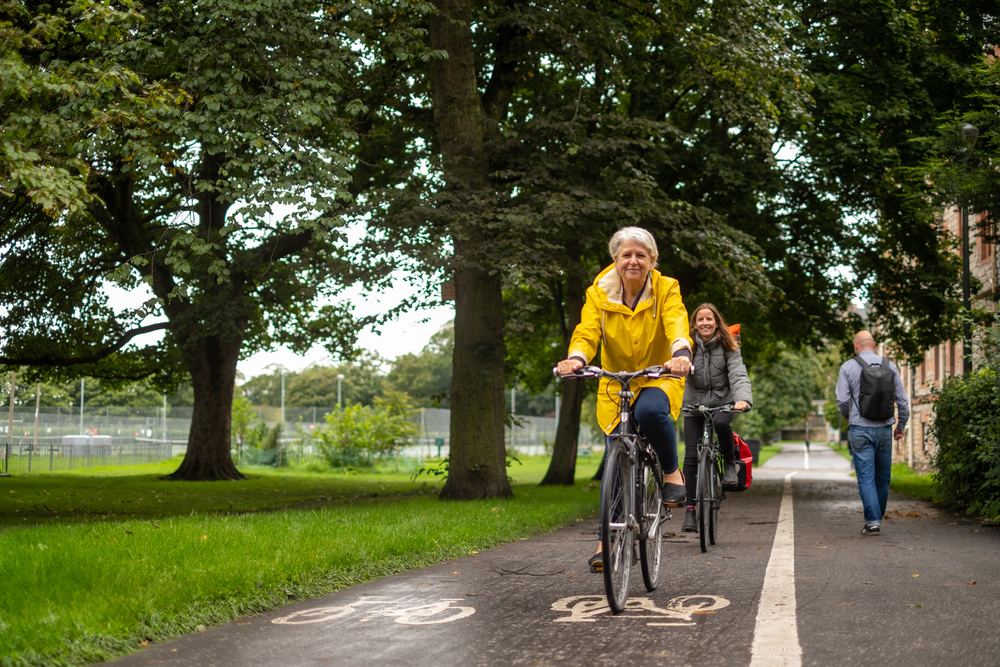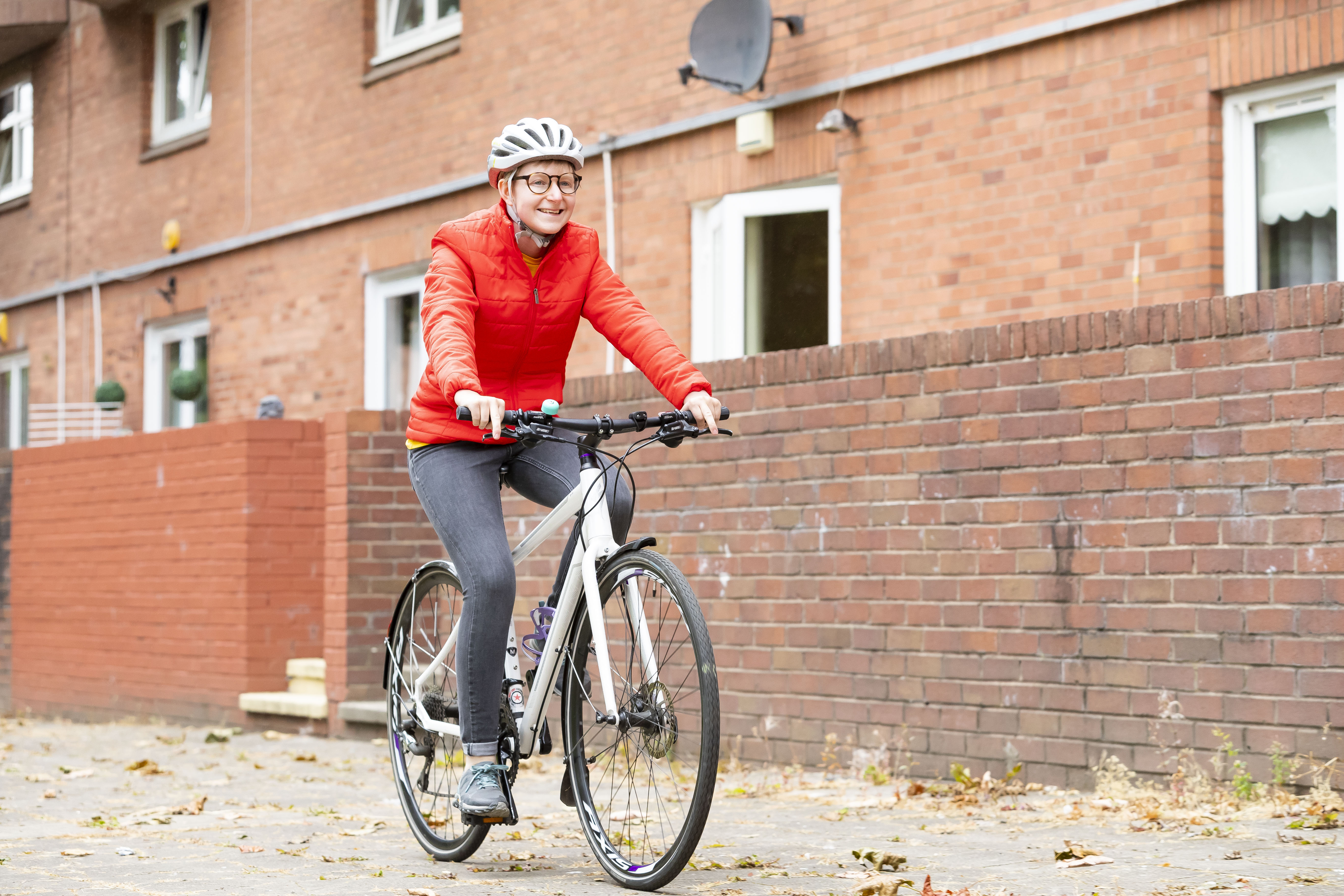In June, Cycling Scotland’s Nick Montgomery (Monitoring & Development Officer) and Valentin Jeanjean (Behaviour Change Manager) were delighted to present at the 20th Annual Transport Practitioners’ Meeting. For the first time in three years, over 200 delegates and speakers met at the University of Greenwich to share best practice and learn about the latest transport research.
Monitoring cycling in Scotland
Cycling Scotland presented data on the increase of in cycling in Scotland since Covid-19.
The key findings from our National Monitoring Framework of cycle counters included:
- 47% more cycling journeys in Scotland between March 2020 and March 2021 compared to the same period 20192020
- Since the first Covid lockdown in March 2020, 20 of the 24 months analysed have shown an increase in cycle rates compared to the corresponding month in 2019
- The national rate of cycling journeys looks to have stabilised above the pre-Covid baseline levels.
Our nationwide attitudes & behaviours research also provided insights. Encouragingly, the findings showed:
- The proportion cycling at least once a week show significant increases in 2021 compared to 2019:
- Everyday journeys on bikes by younger people have increased from 27% of 18- to 24-year-olds in 2019 to 39% in 2021
- The number of people citing the environment as a reason they cycle increased from 12% in 2017 to 22% in 2019 and 28% in 2021.
Our research showed that major barriers to cycling remain:
- Parents are concerned about the safety of their local roads for children, with 70% rating them negatively and one-in-six (16%) saying the roads were ‘extremely unsafe’ for kids cycling
- Almost two-thirds (61%) said a lack of cycle lanes or traffic-free routes prevented them cycling more
- One in five (20%) reported that they did not have somewhere they could store a bike.
The trends presented indicate that the pandemic has caused many individuals to reassess how they travel and acted as a stimulus for cycling in Scotland. To help tackle the climate emergency, it is vital that this momentum in active travel is not lost, and local and national investment in active travel continues to increase.

Affordable Access to Bikes research
On the second day of the conference, we presented the findings of the Affordable Access to Bikes research, jointly commissioned by Cycling Scotland, Scottish Enterprise and Zero Waste Scotland.
Exploring the topic of affordable access to bikes, the research found that an estimated 3.1m bikes are unused across the nation. This, correlated with our attitudes and behaviours research showed that the cost of buying and maintaining a bike was a major barrier to cycling for over a third of the population presents an opportunity to increase cycling uptake in Scotland.
Interviewing 40 local, national and international organisations, researchers aimed to identify bike reuse and recycling pathways, as well as opportunities for skills development and employment associated with manufacturing, retail and recycling of unused bikes.
Key findings included:
- Developing bike reuse present opportunities to create a potential 3,500 jobs
- Re-use organisations are likely to be successful where they have a social purpose at their core
- Viability of social enterprises focused specifically on bike re-use could be improved with access to more and better-quality bikes
- Better communication with households on recycling pathways is needed
- Increased capacity to deliver recycling initiatives is needed, with more qualified staff
- Consideration must be given to a recovered spares model, particularly for e-bikes.

Key themes from the conference
- Just transition: Kate Pangbourne from the University of Leeds noted that if we’re to achieve a just transition to net zero, we need the same levels of investment in active travel and public transport that is on a par with their societal and environmental benefits. She warned against a disproportionate focus on electrification to achieve net-zero.
- Accessibility: Dr Kay Inckle of Wheels for Wellbeing presented the findings of the 2021 Disability and Cycling National Survey and recommended a universal rollout of fully accessible cycle infrastructure and facilities, signposting to their “Guide to Inclusive Cycling”.
- Gender equality: Helena Shaw of Midlands Connect showed that poor transport planning choices could unequally disbenefit women. Decision-makers need to consider the specific barriers experienced by women and ensure that planning decisions encourage positive behaviour change by reducing safety issues, the gender wage gap, and increase accessibility to important services for women.
- Suburban active travel: Rachel Aldred of the Active Travel Academy demonstrated how investment active travel investment in three Outer London boroughs resulted in significant changes in travel behaviour and increased the likelihood of residents meeting the target of 140 minutes of exercise a week.
- Consulting with future generations: Recognising the children are often left out of consultation processes, Ben Addy of Sustrans showcased innovative engagement techniques used as part of the Child Friendly Newington project, making sure the views of those most impacted by planning decisions were duly considered.
- Bikes for businesses / last mile deliveries: Sarah Hearn of Marston Holdings talked about under-exploited potential of e-cargo bikes for freight; challenges to overcome revolved around business engagement, a lack of infrastructure suitable for safe and convenient e-cargo bike use and issues with reliability of batteries.
We’d like to thank the organisers for providing delegates at the conference with a well-rounded selection of speakers with a strong emphasis on active travel through the event.
Making sustainable transport accessible to all is key in meeting our climate goals and this can only be achieving through extensive collaboration and knowledge sharing.